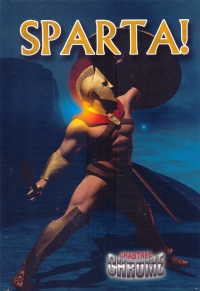| ________________
CM . . .
. Volume XIX Number 39. . . .June 7, 2013
excerpt:
The high interest titles from Crabtree’s “Chrome” series are written for those grade 4-6 students who are reading at a beginning to middle grade two level (levels L & M). Each title is colourfully illustrated and contains captions of important facts, a bibliography, glossary and index. Sparta is a surprisingly detailed examination of the history of the ancient Greek city-state of Sparta. Because of the popularity of movies such as The 300 and video games on Sparta, many students will be interested in this title. Students will learn about the warrior culture of Sparta and how it contrasted with Athens, Sparta’s arch-enemy and rival for Greek supremacy. Spartans, the students will learn, hated Athenian democracy and luxurious living. The ideal life for a Spartan was a simple and strict military society. Sparta was ruled by kings, but the real power was in the ephors, a council of five men who made and enforced the city’s laws. If a Spartan broke one of the laws, the individual would be punished or executed. In Sparta, boys learned how to be good soldiers, and, at seven years of age, they were taken from their families to live in barracks. They were trained not to show pain and were punished if they did. Spartan men were fully trained at 20 but were not allowed to marry until they were 30 and, even then, they still lived in barracks and only went home to visit. Girls were married at 18, and their main role was to have children and take care of the family. Spartan soldiers were called hoplites, and when they went into battle, they expected to win or be killed. Sparta fought many wars over the course of its history: the quasi mythological Trojan War, the wars against the mighty Persian Empire, with the famous battles at Marathon and Thermopylae, and the 27 year long Peloponnesian War it fought with Athens, finally gaining supremacy over the Greek city-states. Spartan power waned when the city states of Greece rebelled; however, the tales of Spartan courage and prowess in war are eternal. Recommended. Ian Stewart teaches at Cecil Rhodes School in Winnipeg, MB.
To comment
on this title or this review, send mail to cm@umanitoba.ca.
Copyright © the Manitoba Library Association. Reproduction for personal
use is permitted only if this copyright notice is maintained. Any
other reproduction is prohibited without permission.
NEXT REVIEW |
TABLE OF CONTENTS FOR THIS ISSUE
- June 7, 2013.
AUTHORS |
TITLES |
MEDIA REVIEWS |
PROFILES |
BACK ISSUES |
SEARCH |
CMARCHIVE |
HOME |
